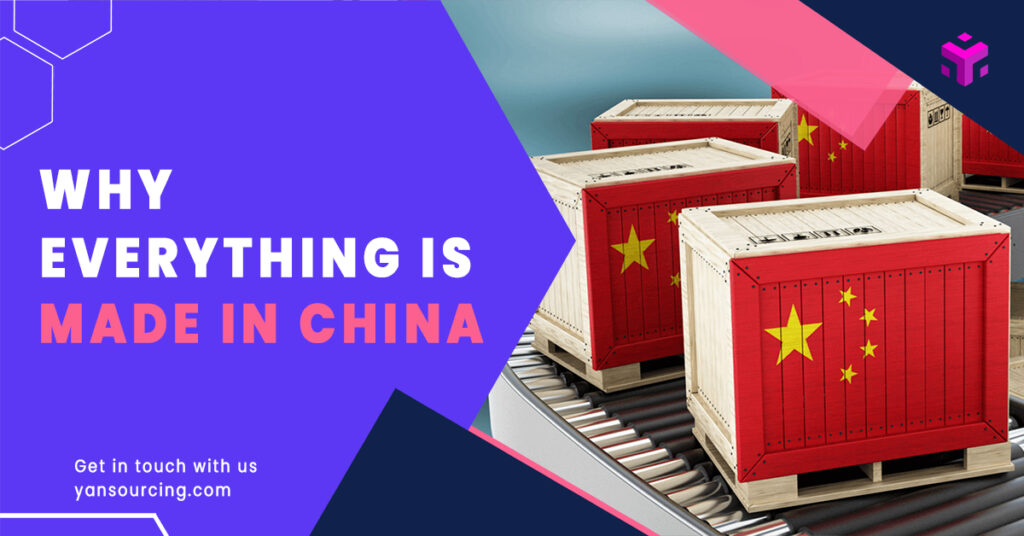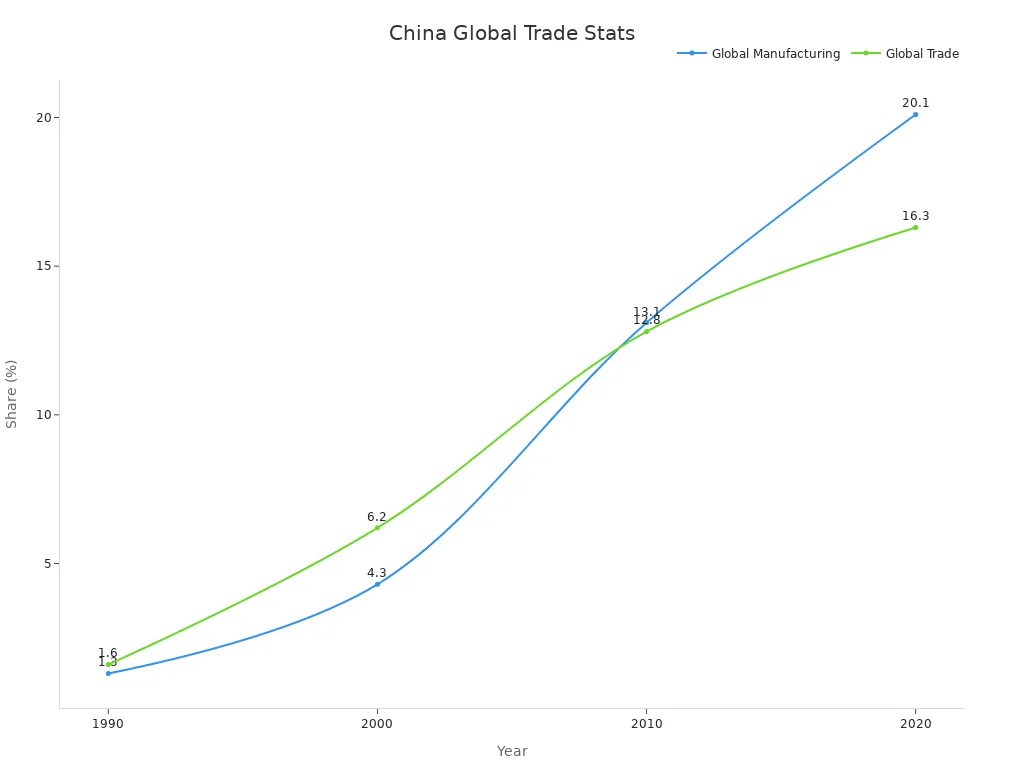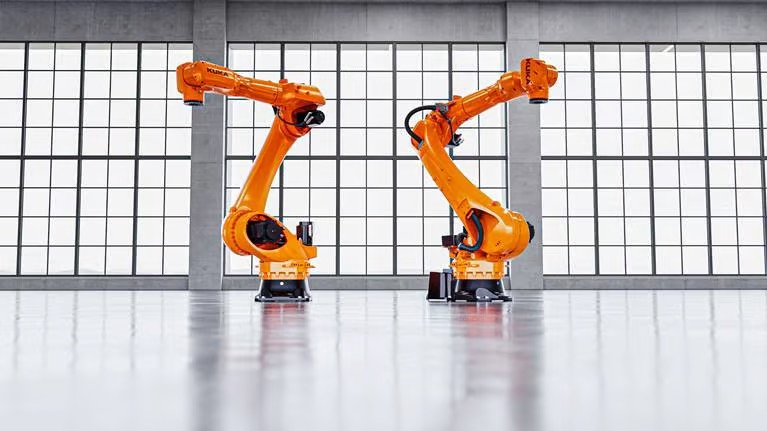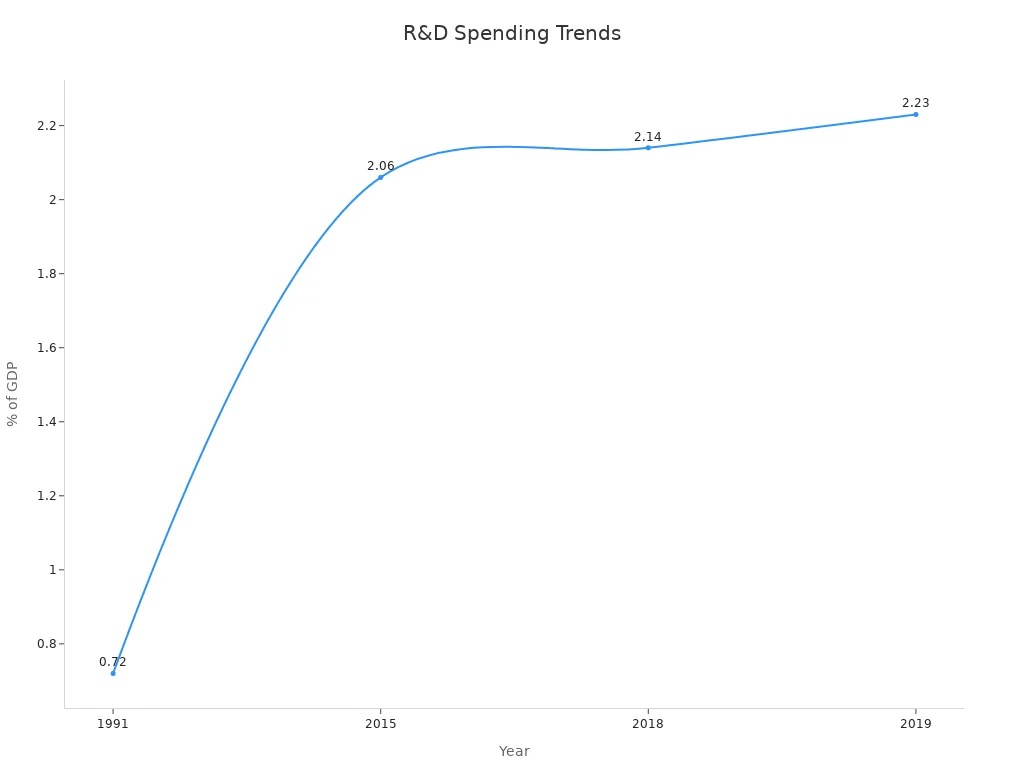
Have you ever wondered why everything made in China is so prevalent? This phenomenon can be attributed to strategic planning, low production costs, and efficient factories. Over the years, China has established itself as a leader in manufacturing. From 1995 to 2015, its factories experienced an impressive growth rate of 12% annually. This expansion was fueled by policies that attracted foreign investment. Millions of workers transitioned from rural farms to bustling urban factories.
China’s commitment to progress has not wavered. By 2023, the country had constructed over 2.5 million 5G towers, which support smart factories and cutting-edge technologies like AI. With an investment of $1.4 trillion aimed at advancing technology, these strategic decisions are precisely why everything made in China is so widely available in global markets today.
Key Takeaways
In the late 1970s, China changed to a market economy. This helped private businesses grow and succeed.
Special Economic Zones (SEZs) brought in foreign money. These zones boosted exports and became busy economic areas.
Labor changes created a large, skilled workforce. This improved productivity and helped China’s factories succeed.
Modern infrastructure and fast networks, like 5G, make work easier. They also improve supply chains.
Joining global trade increased China’s role in making and selling goods. Now, it is important worldwide.
Yansourcing helps businesses get building materials from China. It connects them with trusted suppliers and checks quality.
The government gives money and makes trade deals. This keeps China’s factories strong and costs low.
China focuses on new ideas and technology, like robots and research. This helps it stay a leader in making goods.
Why Everything Made in China: Economic Reforms
Shift to a Market-Based Economy
Do you know how China became a manufacturing giant? It began in the late 1970s. The government changed from strict Soviet-style rules to free-market ideas. This allowed private businesses to grow. During this time, exports grew quickly. In 1978, exports were $14.3 billion. By 2018, they reached $2.2 trillion, growing 16.2% yearly.
Foreign investments also helped a lot. In 1978, foreign direct investment (FDI) was $0.57 billion. By 2018, it grew to $137.3 billion, with an annual growth rate of 18.3%. Here’s a simple table of these numbers:
Metric | 1978 Value | 2018 Value | Growth (%) |
|---|---|---|---|
Exports | $14.3 billion | $2.2 trillion | 16.2 |
Foreign Direct Investment | $0.57 billion | $137.3 billion | 18.3 |
This move to a market-based economy helped make Chinese goods available worldwide.
Special Economic Zones (SEZs) and Open-Door Policy
China didn’t stop there. In 1979, it created Special Economic Zones (SEZs). These zones attracted foreign investors and boosted exports. The first SEZs—Shenzhen, Zhuhai, Shantou, and Xiamen—became busy economic centers.
Here’s what made these zones special:
They followed free-market rules to grow faster.
Local leaders had more control to try new ideas.
Foreign companies brought money and new technology.
The open-door policy also helped. By welcoming global trade, China became a big player in the world economy. This is why so many products made in China are sold everywhere.
Workforce Changes and Labor Reforms
China’s workers were key to its success. Labor reforms moved millions from farms to city factories. This created a large, skilled workforce.
Industries grew as workers moved to better jobs. Productivity increased, but some challenges remain. A small rise in unemployment shows some workers lack needed skills. Still, these reforms made the workforce stronger.
These changes show that China’s success isn’t just about low costs. It’s also about smart reforms and a strong labor force. Together, these factors made China a leader in global manufacturing.
Global Supply Chain Factors Behind Why Everything Made in China
Cost Competitiveness and Labor Availability
China is a top manufacturing hub because of low costs. Wages in China have gone up over time. In 1990, workers earned $55 monthly. By 2018, this rose to $990. This is more than wages in Vietnam. But Chinese workers are often more skilled. Their experience makes up for higher pay. This balance keeps China attractive for businesses.
Labor productivity in China has grown quickly. From 2013 to 2022, it grew faster than in the U.S. or Germany. Even with rising wages, workers’ efficiency helps China stay competitive. Big factories also lower costs. They make large amounts of goods cheaply. This makes products affordable worldwide.
Advanced Infrastructure and Logistics Networks
China’s modern infrastructure supports its manufacturing success. The country has improved its logistics systems. Goods can now move faster and easier. By 2023, China built over 2.5 million 5G towers. These help with automation and smart factories.
China also uses satellite data and AI to improve logistics. Satellites track traffic, weather, and risks. This ensures smooth operations. Data centers analyze information in real-time. These tools make China’s supply chains efficient. This gives China an edge in global trade.
Integration into Global Trade and Supply Chains
China’s role in global trade has grown a lot. In 1990, it made up 1.3% of global manufacturing. By 2020, this jumped to 20.1%. Its share of global trade rose from 1.6% to 16.3%. This shows how connected China is to world trade.

China has strong trade relationships worldwide. It had a trade surplus of $880 billion. This includes $388 billion with the U.S. and $137 billion with Hong Kong. China trades with Asia, North America, and Europe. This makes it a key player in global supply chains.
Chinese factories, suppliers, and distributors work closely together. This teamwork reduces delays and keeps goods flowing. It makes China a reliable place for businesses to manufacture products.
Yansourcing’s Role in Sourcing Building Materials
Finding building materials in China can feel confusing. Yansourcing helps make it simple for you. With over 10 years of experience, they help businesses find great materials at good prices. Whether you need furniture, lights, or marble tiles, Yansourcing is here to help.
Why pick Yansourcing?
They connect you with trusted suppliers, offer personal help, and make sourcing easy.
What Makes Yansourcing Special?
Wide Product Selection
Yansourcing has many building materials to choose from. They offer bathroom fixtures, cabinets, doors, and more. You can even get custom-made items to fit your needs.Reliable Quality Checks
Worried about bad products? Yansourcing checks everything to ensure high quality. Their team inspects items carefully, so you don’t get faulty goods.Smooth Shipping and Storage
Shipping can be hard, but Yansourcing takes care of it. They handle storage and delivery, making sure your materials arrive safely and on time.
How Does Yansourcing Make Sourcing Easier?
Getting building materials from China can be tough without help. Yansourcing connects you with reliable factories. They negotiate prices, handle details, and make the process stress-free. This lets you focus on growing your business while they do the hard work.
Here’s a quick summary of Yansourcing’s services:
Service | Benefit |
|---|---|
Supplier Evaluation | Ensures you work with honest manufacturers. |
Customization Options | Lets you get products made just for you. |
Transparent Pricing | No hidden costs, so you know what you’re paying. |
Logistics Management | Handles shipping and storage for easy delivery. |
By working with Yansourcing, you save time and money. You avoid common problems and get the best materials.
If you need building materials from China, Yansourcing is the solution. Their skills ensure you get top-quality products without the hassle.
Technological Advancements in Chinese Manufacturing

Investments in Research and Development (R&D)
China leads in manufacturing because of smart R&D spending. Over ten years, its R&D budget has nearly tripled. Almost half of this money goes to making electronics and machinery. This focus helps China stay ahead in industries like cars and phones.
Here’s how R&D spending has grown:
Year | R&D Spending as % of GDP |
|---|---|
1991 | 0.72% |
2015 | 2.06% |
2018 | 2.14% |
2019 | 2.23% |

In 2018, businesses paid for 76.6% of R&D, or $354.4 billion. This focus on new ideas keeps China a leader in global manufacturing.
Adoption of Automation and Smart Manufacturing
Automation is another reason China leads in manufacturing. The use of robots in factories has grown fast. In 2015, 90,000 robots were installed. By 2023, this number reached 240,000, the most in the world.
Companies like Haier use AI and data to improve factories. These tools cut machine downtime by 40% and boost efficiency by 15%. AI also helps factories quickly adjust to market needs.
The government supports these changes with programs like “Made in China 2025.” This plan pushes factories to use smart technologies, keeping China ahead in advanced manufacturing.
Role of Chinese Tech Giants in Driving Innovation
Big tech companies in China lead in factory innovation. Huawei uses AI to lower defects in electronics by 25%. Haier and others are adding robots to make production better and faster.
Modern warehouses and smart systems also help save money and time. These tools ensure products are made with high quality and precision.
China’s tech giants are shaping the future of factories. Their work is a big reason why China stays the world’s top manufacturer.
Government Help for Manufacturing in China
The Chinese government plays a big part in helping factories grow. Its rules, money support, and smart plans make China a top manufacturing country. Let’s see how this works.
Money Support and Tax Cuts for Factories
Think about running a factory and getting money to grow. That’s what the Chinese government does for its factories. It gives money and tax cuts to lower costs. Since 2009, China has made about 5,400 money-help policies. These cover almost 95% of all trade actions in the country.
Some industries get more help than others:
20% of industries get over half of the money help.
Products like electric machines grow exports by 7% with help.
Steel industry help boosts car exports by 3.5%.
This support doesn’t just save money. It also makes Chinese products cheaper and better for global markets. That’s why you see “Made in China” on so many things.
Trade Deals and Export Support
China’s trade deals also make its factories strong. These deals help Chinese goods sell in other countries. For example, exports to East Asia and the Pacific grew by $288 billion from 2018 to 2023. ASEAN countries made up $205 billion of this growth.
The Regional Comprehensive Economic Partnership (RCEP) is a big deal. It links China with Southeast Asia, making trade easier and faster. This helps China stay important in global trade.
The government also helps businesses sell their goods worldwide. These efforts make sure Chinese products reach every part of the world.
Focus on Important Industries
China doesn’t help every industry—it picks the most important ones. The “Made in China 2025” plan focuses on ten key areas, like:
New tech like AI and 5G
Robots and smart machines
Space and airplane tools
Electric cars and green energy
High-tech medical products
Here’s a table of these industries:
Key Industry | What It Includes |
|---|---|
New tech like AI and 5G | Smart technologies for the future |
Robots and smart machines | Machines that work faster and smarter |
Space and airplane tools | Tools for planes and space travel |
Ships and ocean technology | Advanced ships and sea tools |
Fast trains and rail systems | High-speed trains and railways |
Electric cars and green energy | Eco-friendly vehicles and energy tech |
Power-saving equipment | Tools for saving energy |
Modern farming tools | Better tools for farming |
New materials | Special materials for many uses |
High-tech medical products | Advanced healthcare tools |
By focusing on these areas, China stays ahead in new ideas and technology. This smart plan keeps its factories strong and ready for the future.
Yansourcing’s Expertise in Navigating Government Policies
Understanding government rules in China can be confusing. You might struggle with trade laws, tax benefits, or meeting regulations. Yansourcing is here to make things easier for you. With over 10 years of experience, they help businesses succeed in China’s manufacturing world.
Yansourcing knows China’s policies very well. They stay updated on new rules and benefits. For example, if you want tax cuts or subsidies, Yansourcing can guide you. They’ll find the right programs for your business and help you qualify.
Trade agreements can also be tricky. China has deals like the Regional Comprehensive Economic Partnership (RCEP). These deals lower costs and make exporting simpler. Yansourcing helps you use these benefits. They handle forms and talks, so you can focus on growing your business.
Yansourcing is great at ensuring compliance too. China has strict rules for product quality and safety. If you’re buying building materials, Yansourcing checks everything carefully. They work with suppliers to meet all standards and avoid problems.
Pro Tip: Working with Yansourcing saves time and reduces risks. Their knowledge of government rules means fewer worries for you.
Yansourcing offers services tailored to your needs. They don’t give one-size-fits-all advice. Whether you’re new or experienced, Yansourcing supports your goals in China’s market.
By choosing Yansourcing, you get a partner who knows China’s policies inside out. They help you gain government benefits and avoid mistakes. Their expertise makes sourcing simple, affordable, and stress-free.
China’s Domestic Market and Export-Oriented Growth
The Role of China’s Large Consumer Base
China’s huge population helps its factories grow. With over 1.4 billion people, the need for products is very high. This pushes companies to make new and different items. For example, by 2025, the consumer goods industry is expected to produce $7.5 trillion worth of goods. It will also have a value-added margin of 22%. Here are some key numbers:
Statistic | Projected Value in 2025 | CAGR (2025–2029) |
|---|---|---|
Value added in Consumer Goods | $1.7 trillion | 2.01% |
Output in Consumer Goods | $7.5 trillion | 3.02% |
Value added per capita | $1,200 | N/A |
Number of enterprises | 3,090 | 2.00% |
Labor productivity | $39.9 million | N/A |
These figures show how strong China’s local market is. Businesses can sell to millions of people who want good-quality products. This strong local demand also helps factories make goods for export.
Export Plans and Global Market Reach
China’s export plans have made it a global leader in manufacturing. In 2023, it produced $4.66 trillion in manufacturing value-added. This was 29% of the world’s total, more than the next four largest economies combined. Electronics now make up 24% of China’s exports, showing its focus on high-tech goods.
The “Made in China 2025” plan is a big part of this success. It aims to improve ten key industries, like robotics, green energy, and aerospace. China spends a lot on research and development (R&D) to stay competitive. Over the last ten years, R&D spending in manufacturing has nearly tripled, especially in electronics and machinery.
These efforts help China sell its products worldwide. If you’re looking for suppliers or want to grow your business, China’s export-focused factories offer great chances.
Balancing Local Needs with Export Goals
China balances its local market needs with its export goals. The Dual Circulation Strategy is an example of this. It focuses on increasing local spending while keeping strong trade ties with other countries. This makes China’s economy flexible and ready for global changes.
For businesses, this balance means more opportunities. Policies support local investments to make advanced goods. At the same time, export plans are expanding to new markets. This helps businesses succeed both in China and abroad.
By focusing on both local and global markets, China creates a strong economy. Companies can rely on a stable local market and also reach customers worldwide. This smart strategy keeps China a top player in manufacturing and trade.
Yansourcing: Making Product Sourcing in China Simple
Easy Solutions for Building Materials
Getting building materials from China can seem hard, but Yansourcing makes it simple. Whether you need furniture, lights, or custom cabinets, they can help. Their expert team ensures you get great products at good prices. With trusted manufacturers, Yansourcing turns your ideas into real products.
Here’s why their services are special:
Expert Sourcing: They find reliable suppliers who match your needs.
Quality Checks: Products are carefully inspected to meet your standards.
Order Tracking: They follow your orders and check items during production.
Customer Help: A team member answers your questions within 8 hours.
Service Type | What It Does |
|---|---|
Expert Sourcing | Helps turn orders into profits with expert help. |
Quality Checks | Free inspections and temporary storage for your products. |
Manufacturer Selection | Works with top manufacturers for high-quality goods. |
Order Tracking | Tracks orders and checks quality during production. |
Product Development | Helps turn your product ideas into real samples. |
Yansourcing makes sourcing easier, saving you time and effort. You can focus on growing your business while they handle the hard parts.
Quality and Shipping Expertise
Worried about bad products or late shipping? Yansourcing has it covered. They check every product from the factory to ensure quality. They also work with trusted shipping companies for flexible delivery options by air, sea, or rail.
Here’s how Yansourcing keeps things running smoothly:
Careful Inspections: They check products during and after production to avoid problems.
Trusted Shipping: Flexible options ensure your goods arrive safely and on time.
Order Updates: They track every step, so you always know what’s happening.
Evidence Description | Type of Evidence |
|---|---|
Yansourcing checks all items from factories to ensure quality. | Quality Control |
They work with trusted shippers for flexible delivery options. | Logistics Performance |
Orders are tracked and inspected during production. | Quality Control and Logistics |
With Yansourcing, there are no surprises. Their skills in quality and shipping make the process smooth from start to finish.
Helping E-commerce and Wholesale Businesses
If you run an online store or buy in bulk, Yansourcing has solutions for you. They help find suppliers, customize packaging, and create new products. Their services make your business easier and more efficient.
Here’s what they offer for e-commerce and wholesale:
Sourcing: They find suppliers to make and customize your products.
Custom Packaging: Services like labeling and packaging fit platforms like Amazon.
Order Handling: From start to finish, they manage your orders for on-time delivery.
Service Type | What It Does |
|---|---|
Sourcing | Finds suppliers to make and customize products for online stores. |
Quality Control | Checks all items to avoid defective products. |
Logistics | Works with shippers for flexible delivery options (air, sea, rail). |
Product Development | Helps create new products or improve existing ones. |
Order Handling | Manages orders from start to delivery for timely service. |
Custom Packaging | Offers labeling and packaging for specific online platforms. |
Yansourcing’s quick and reliable help keeps you ahead in e-commerce. With their support, you can grow your brand while they handle the details.
Conclusion
China became a manufacturing leader through years of smart planning. Economic growth and government help played big roles. Its factories are part of global trade and use advanced technology. By focusing on exports and new ideas, China stays the “world’s factory.”
If you need products, Yansourcing makes it easy. They guide you through China’s manufacturing system. Whether you need building materials or other items, their services save you time and work.
FAQ
1. Why is China a top manufacturing country?
China leads because of low costs, skilled workers, and modern factories. Its strong trade connections and government help make it even stronger.
2. Why are products from China so cheap?
Big factories in China make lots of items quickly. This lowers costs. The government also gives money and tax breaks to keep prices low.
3. How does Yansourcing make sourcing easier?
Yansourcing finds trusted suppliers and handles quality checks and shipping. They take care of the hard parts, so you can focus on your business.
4. Can Yansourcing help with custom-made products?
Yes! Yansourcing works with factories to create unique designs or materials. They make sure your products meet high standards.
5. Is it safe to buy building materials from China?
Yes, it’s safe with a partner like Yansourcing. They check products carefully and only work with trusted factories to avoid problems.
6. How does China stay strong in global trade?
China makes smart trade deals and focuses on important industries. It balances making goods for its people and selling to other countries.
7. What industries benefit most from China’s factories?
Electronics, clothing, machines, and building materials do well. China’s advanced factories and global reach help these industries grow.
8. Why should I pick Yansourcing for my needs?
Yansourcing offers expert help with suppliers, quality checks, and shipping. They know China’s market well and make sourcing simple for you.

